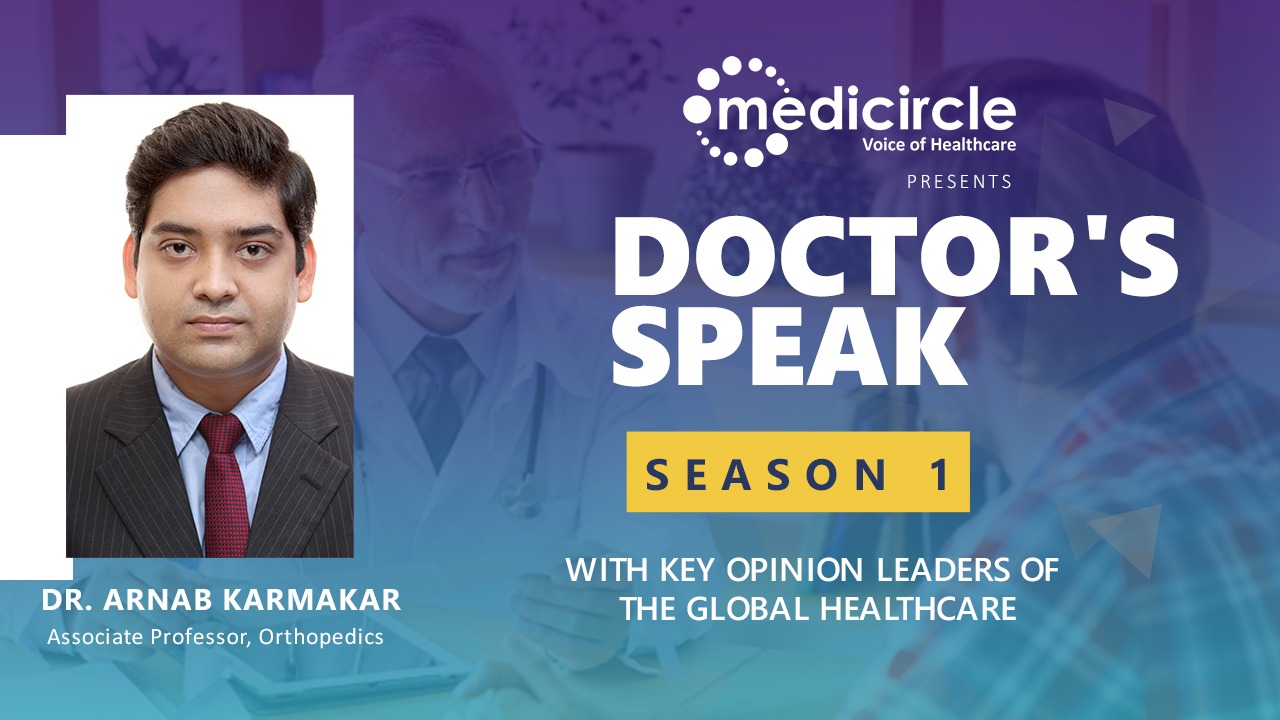Orthopedics is a branch of medicine that focuses on the care of the musculoskeletal system. This system is made up of muscles and bones, as well as joints, ligaments, and tendons.
Dr. Arnab Karmakar, Associate Professor, Department of Orthopedics, IPGME&R. He has experience of 10 years as an MS Orthopedics at SSKM Hospital in Kolkata.
IPGMER or in its full name Institute of Post-Graduate Medical Education and Research and Seth Sukhlal Karnani Memorial Hospital, colloquially known as P. G. Hospital (Presidency General Hospital), is a public medical school and tertiary referral government hospital for the state of West Bengal, India and is a national research institute. It is currently the best super-speciality hospital in West Bengal.
Taking care of Osteoporosis is important
Dr. Arnab informs, "I think people above 65 years old, most of them actually have osteoporosis, which is porotic bones and the bones are very weak from inside. So, whenever they have even a very trivial trauma at home or an injury, they fall in the bathroom or somewhere, they will actually suffer a big fracture. And the outcome of these fractures is not always very good, even if you treat it with proper surgery, because it's a very big trauma, it's a mental and physical trauma for them. So, the best thing we can do to have a very good outcome for this age group of patients is that if we can prevent osteoporosis or if we can make the bone strong from the internal structure. For that thing, it is very necessary that we detect osteoporosis or weak or porous bone from its starting point. That means maybe for women ladies around 45 years, or for men, it is around 50 to 55 years. Having detected osteoporosis is very important. And, to start the initial therapy of osteoporosis is very important. But, the most important thing is to have a very good and balanced diet plan for them, which can provide the adequate amount of calcium and vitamin D, which is responsible for maintaining very good health for our bones," he says.
Prevention is better than treating the disease
Dr. Arnab suggests, "Prevention is always a better option than treating any disease. So, if you understand the common orthopedic problems may be low back pain, maybe knee pain, maybe neck pain, most of them are actually because of an unhealthy lifestyle, and weak bones and muscles. As we already discussed the bones that we need to detect osteoporosis from the very beginning stage, we need to have a very proper diet plan so that an adequate amount of calcium and other nutrients are there. Moreover, you should have a healthy lifestyle, do some amount of physical exercise every day, which will keep your bones and muscles healthy. Hence, if you do all these things together from a very young age and have a healthy lifestyle, I think you can stop these problems automatically in your future, " he says.
Myths around Knee Replacement Surgery
Dr. Arnab busts some myths about the surgery, "I think there are a lot of myths around knee replacement surgeries because a lot of patients are suffering from stage 4 of osteoarthritis, that is the end stage 3. At stage 4, there is no other option left. The only option is to replace the knee joint. But, the social stigma is that even if you go for a knee replacement 90% of them will not be able to work normally like they were before or might be, they are afraid of that, my own knee will not be there, there will be something metallic in our body, and this metals will actually cause harm to my body. All these myths are there, some patients say that I don't feel that my legs are there, I feel that they are not there. These are some stigmas and these are all myths. So, if I break it down into points that after getting a total knee replacement,
You can work as much as you can You can climb stairs You can take private communication services You are just not allowed to sit on the floor You can drive a car You can play golf You can do your physical activities
Hence, it's not something that people should be afraid of," he says.
Impact of coronavirus outbreak
Dr. Arnab shares his experience with the pandemic, "I think coronavirus has affected everyone starting from every level of people. Being a doctor, it's very difficult. And also, it's a huge responsibility to keep me free from infection and also, I make sure that I don't propagate the infection to my patients. So, it has made me more responsible, we have been more cautious and we are fighting with practicality. I think there is nothing to be very panicky about or nothing to be very afraid of because getting panic will make us nervous and depressed. All of it will leave negativity. Rather, we should face it with all positivity and we should keep ourselves engaged in positive thoughts or positive work. Maybe, engross ourselves in some hobbies we like. And, we should practice the safety guidelines, always. We should not be reluctant at any point in time that Coronavirus cannot affect me. Everybody can be affected by this virus. So, safety measures should not be neglected, they should be practiced regularly, like wearing a mask and keeping your hygiene. Washing your hands repeatedly. All these things have to be practiced properly, " he says.
(Edited by Sana Khan)

 To start the initial therapy of Osteoporosis is very important", says Dr. Arnab Karmakar, Associate Professor, Department of Orthopedics, IPGME&R and SSKM Hospital.
To start the initial therapy of Osteoporosis is very important", says Dr. Arnab Karmakar, Associate Professor, Department of Orthopedics, IPGME&R and SSKM Hospital.








.jpeg)


.jpg)







.jpeg)

.jpg)




.jpg)




.png)

